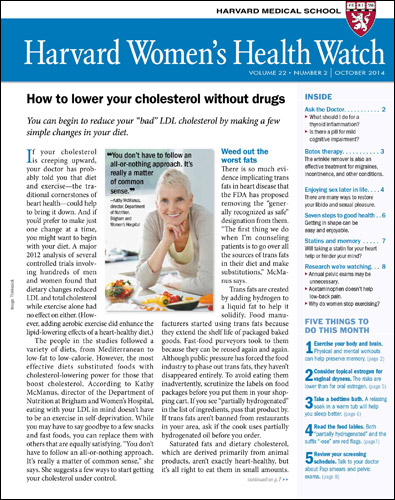Myth busted: bra wearing not linked to breast cancer

Created by Harvard Health Publishing based on content published by 2 Minute Medicine® (view original article).
According to a persistent Internet myth, women who wear bras are more likely to develop breast cancer. Not true. A new study published online in the journal Cancer, Epidemiology, Biomarkers, and Prevention found no link between bra use and breast cancer.
Researchers from the Fred Hutchinson Cancer Research Center in Seattle interviewed more than 1,000 women with the most common forms of breast cancer — invasive ductal carcinoma and invasive lobular carcinoma. They also interviewed nearly 500 randomly selected women without breast cancer. The interviews covered breast cancer risk factors and bra-wearing habits.
No association was seen between risk of either invasive ductal carcinoma or invasive lobular carcinoma and any aspect of bra wearing, including cup size, use of a bra with an underwire, age at first bra use, and average number of hours per day a bra was worn.
Why would anyone think that?
In the United States, most women wear a bra for breast support. Wearing a bra can decrease the strain on Cooper’s suspensory ligaments and reduce back pain. Bra-related breast support reduces the risk of damage to fat tissue in the breast associated with vigorous physical activity, and decreases bothersome pain symptoms in women who are breastfeeding a baby.
Unsubstantiated claims in the lay media have linked bra use as a possible risk factor for breast cancer. How? Constraining breast tissue, so the thinking goes, may harm lymphatic drainage, and with it the removal of waste and toxins from the breast.
Although few well-designed studies on the topic exist, no studies to date have found a link between breast cancer and bra use. The study from Fred Hutchinson researchers shows no connection. Ditto the only earlier study of the subject, from the Harvard School of Public Health.
This may not be the last word on the subject, since the Fred Hutchinson study had some limitations. Interviewing women after they had developed breast cancer can lead to recall bias, particularly with regards to historical data such as the age at which they started wearing a bra. In addition, the study included only women who wore bras. A prospective cohort study that recruited women who do not wear bras and following them over time would be a better way to observe the link — or lack of one — between wearing a bra and breast cancer.
In the meantime, women worried that wearing a bra might cause cancer have one less thing to worry about.
About the Author

2 Minute Medicine®
Disclaimer:
As a service to our readers, Harvard Health Publishing provides access to our library of archived content. Please note the date of last review or update on all articles.
No content on this site, regardless of date, should ever be used as a substitute for direct medical advice from your doctor or other qualified clinician.
















